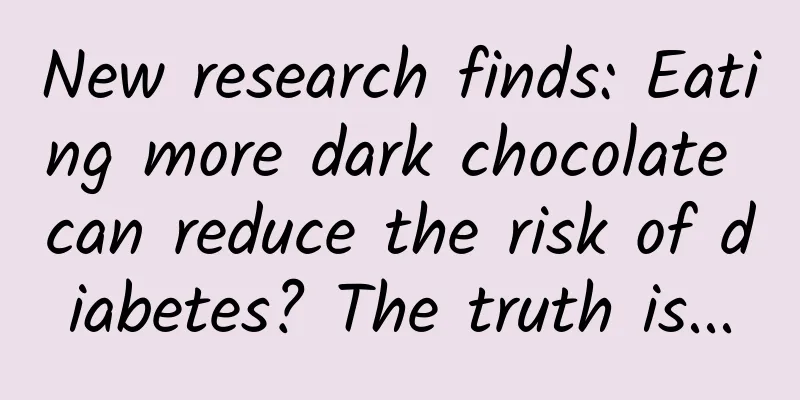New research finds: Eating more dark chocolate can reduce the risk of diabetes? The truth is...

|
Chocolate is delicious and loved by people, but as a high-calorie food, eating chocolate will make you fat, which is also a preconceived impression. But recently, it is said that "a new study found that eating dark chocolate can reduce the risk of diabetes." Is this true? How should we understand this study? Research Interpretation This claim comes from the results of a prospective cohort study recently published by Harvard University researchers in The BMJ. Image source: The BMJ The researchers analyzed three surveys on eating habits spanning two or three decades, and counted the consumption of dark and milk chocolate by more than 110,000 chocolate lovers among the respondents. After eliminating risk factors such as diet and lifestyle, the results showed that people who ate at least 140 grams of any type of chocolate per week had a 10% lower risk of developing type 2 diabetes compared to those who rarely or never ate chocolate; people who ate at least 140 grams of dark chocolate per week had a 21% lower risk of developing type 2 diabetes [1]. In addition, this study also found that eating only milk chocolate for a long time did not significantly reduce the risk of diabetes and could lead to weight gain. Why is this so? Researchers believe that the cocoa content of dark chocolate is higher than that of milk chocolate. The 3-flavanols (flavanols) contained in cocoa and its monomer form epicatechin can help improve insulin sensitivity, protect pancreatic beta cells from oxidative stress damage, reduce the level of pro-inflammatory cytokines, and improve endothelial function. These effects all help to improve glucose metabolism and reduce the risk of diabetes. Dark Chocolate Can it really reduce the risk of diabetes? So, can eating dark chocolate really reduce the risk of diabetes? Can we eat dark chocolate as much as we want? In fact, don’t be happy too soon. Although this study analyzed a large sample size and spanned a long period of time, with more than 110,000 people and a span of 20 to 30 years, its data are all cohort study data, and the research results obtained are only correlation results, which cannot prove a causal relationship between the two. Cohort study : A very important method in epidemiological research, it is an observational study design used to study the relationship between specific exposures (such as lifestyle, environmental factors, genetic characteristics, etc.) and health outcomes (such as disease occurrence, death, etc.). Correlation results : usually refers to the quantitative measurement of the relationship between two or more variables in statistical analysis. Correlation results are very important in scientific research. They help us understand the relationship between variables and provide a basis for further causal research. However, we need to be cautious when interpreting correlation results to avoid over-inference. In other words, although their research results show that there is an association between eating dark chocolate and a reduced risk of type 2 diabetes, it does not mean that eating dark chocolate can reduce the risk of diabetes. In fact, there are some studies that have found that dark chocolate is associated with a lower risk of diabetes. However, some studies have also pointed out that the relationship between the frequency of chocolate consumption and the lower risk of diabetes may also be due to the active choice of diabetic patients. For example, diabetic patients choose to eat less chocolate and avoid sweets [2]. As for the flavanols mentioned in the study, they are a type of flavonoid, a natural plant compound found in many vegetables and fruits, such as cocoa, green tea, apples, blueberries, and kale [3]. However, the evidence that flavanols can reduce diabetes is insufficient. For example, last year a clinical trial on cocoa flavanols and diabetes was supported by chocolate and pharmaceutical companies, but the results still did not find that consuming cocoa can help reduce the risk of diabetes [4]. The trial was a large randomized clinical trial with a 2×2 factorial design, testing the preventive effect of cocoa extract and multivitamins on diabetes, involving a total of 21,442 American adults, including 12,666 women over 65 years old and 8,776 men over 60 years old. Participants were randomly assigned to receive cocoa extract (500 mg of cocoa flavonoids per day, including 80 mg of catechins) or placebo. The results showed that 801 new cases of type 2 diabetes were reported during an average follow-up of 3.5 years. After analysis, it was concluded that an average of 3.5 years of cocoa extract supplementation did not reduce their risk of developing type 2 diabetes in middle-aged and elderly adults. In general, it is too early to say that eating dark chocolate can reduce the risk of diabetes or even prevent diabetes. Can diabetics eat chocolate? The raw material for making chocolate is cocoa beans. After being picked, the cocoa beans are fermented, roasted, peeled, and then ground and squeezed into "cocoa pulp", also known as "cocoa liquor". Cocoa liquor can be separated into cocoa butter and cocoa powder, which can be used to make various kinds of chocolate. Copyright images in the gallery. Reprinting and using them may lead to copyright disputes. Cocoa butter, as the name implies, is also fat. Moreover, the saturated fat content in cocoa butter is high, and its properties are similar to those of animal oil. Eating too much is not good, and it will increase the risk of cardiovascular disease. Cocoa powder contains antioxidants such as flavanols. Dark chocolate contains more cocoa powder. However, dark chocolate has a bad taste and is very bitter. Commercially available chocolate products usually have a lot of sugar added. Therefore, delicious chocolate generally contains sugar and fat, and is a high-calorie food. If diabetic patients eat too much chocolate, their blood sugar will rise, increasing the risk of cardiovascular disease and other complications. But overall, for diabetic patients, eating chocolate in moderation is not a big problem. According to current research, eating dark chocolate in moderation does not increase the risk of diabetes[5][6]. Therefore, if you really want to eat chocolate, you can still eat it in moderation. In addition, when eating chocolate, please also pay attention to: 1. Eat dark chocolate first. The benefits of chocolate mainly come from the antioxidants such as flavanols in it, and the flavanol content in dark chocolate is higher. Of course, the higher the proportion of dark chocolate in chocolate, the bitterer the taste will be. You have to make a trade-off between health and deliciousness. Milk chocolate does not have dark chocolate, so eat less. 2. Eat in moderation. Even dark chocolate still contains a lot of fat. Delicious sweetened chocolate also contains sugar. The current dietary guidelines recommend that everyone's sugar intake should not exceed 50 grams per day. When eating, pay attention to the sugar content of chocolate. 3. Eat a healthy diet and exercise moderately. Delicious chocolate is high in sugar and oil. When eating it, you should also pay attention to the proper combination of food and exercise. For example, after eating chocolate, eat less of other things, exercise more after eating, and monitor your blood sugar. This way, you can enjoy delicious food and health at the same time. References [1]Liu B, Zong G, Zhu L, Hu Y, Manson JE, Wang M et al. Chocolate intake and risk of type 2 diabetes: prospective cohort studies BMJ 2024; 387:e078386 doi:10.1136/bmj-2023-078386 [2] CrichtonGE, Elias MF, Dearborn P, et al. Habitual chocolate intake and type 2 diabetesmellitus in the Maine-Syracuse Longitudinal Study: (1975-2010): Prospectiveobservations[J]. Appetite. 2017 Jan 1;108:263-269. doi:10.1016/j.appet.2016.10.008. [3] Alkhudaydi, Hind Mesfer S. and Spencer, Jeremy PE 'A Comparison of the Effects of Green Tea and Cocoa on Glycaemic Control and Insulin Sensitivity in Patients with Type 2 Diabetes Mellitus: a Systematic Review and Meta-analysis'. 1 Jan. 2024: 17 – 36. [4] Jie Li, Howard D. Sesso, Eunjung Kim, JoAnn E. Manson, Georgina Friedenberg, Allison Clar, Trisha Copeland, Aladdin H. Shadyab, Jean Wactawski-Wende, Lesley Tinker, Simin Liu; Cocoa Extract Supplementation and Risk of Type 2 Diabetes: The Cocoa Supplement and Multivitamin Outcomes Study (COSMOS) Randomized Clinical Trial. Diabetes Care 1 December 2023; 46 (12): 2278–2284. https://doi.org/10.2337/dc23-1012 [5] Sheng Yuan, Xia Li, Yalei Jin, et al. Chocolate Consumption and Risk of Coronary Heart Disease, Stroke, and Diabetes: A Meta-Analysis of Prospective Studies[J]. Nutrients. 2017 Jul; 9(7): 688.Published online 2017 Jul 2. doi: 10.3390/nu9070688 [6] CrichtonGE, Elias MF, Dearborn P, et al. Habitual chocolate intake and type 2 diabetesmellitus in the Maine-Syracuse Longitudinal Study: (1975-2010): Prospectiveobservations[J]. Appetite. 2017 Jan 1;108:263-269. doi:10.1016/j.appet.2016.10.008. Planning and production Author: Ruan Guangfeng, Deputy Director of Kexin Food and Health Information Exchange Center Review丨Zhang Yu, researcher/PhD, Chinese Center for Disease Control and Prevention, national health science expert Planning丨Yang Yaping Editor: Yang Yaping |
<<: It’s the “battery anxiety” again! How long can a mobile phone last with 1% battery?
Recommend
Will driverless cars replace taxis?
Ride-hailing app Uber announced yesterday that it...
In just one year, H5 has become like this
Regarding the development of H5, I would like to ...
Get these six points, attracting seed users will not be a problem
After everyone has experienced the first three ti...
App promotion, 5 core steps to acquire app users
Many startups are interested in trying to discove...
If you don't know these iOS tricks after getting an iPhone, then you've wasted your money
Some friends buy an iPhone but still don’t know w...
Wang Tong's "Douyin SEO Practical Course" teaches you how to do Douyin SEO
Training course video content introduction: The s...
Zhihu video income project, simple operation to earn 10000+ per month
I believe many people have heard that Zhihu could...
The air ticket cost 300 yuan, and the fuel cost 110 yuan! What kind of fuel did the plane I took use?
With the rapid development of transportation such...
The five elements landing system of community operation, the only common framework diagram for all big names to earn 100,000 yuan a day [audio course]
The five elements landing system of community ope...
"Tencent Classroom" product operation analysis!
Due to the epidemic in the first half of this yea...
How to quickly increase fans on Kuaishou? What should I pay attention to when increasing followers?
This article mainly introduces how to quickly inc...
Activity review: fission poster activity promotion strategy
Without further ado, let’s get straight to the po...
These 21 points almost summarize all the problems faced by operators. Many people suddenly realize the truth after reading them!
Some time ago, I had in-depth communication and u...
iFlytek’s real dilemma: customers become rivals, technological advantages gradually disappear, and profitability track is uncertain
As former customers such as BAT have become rival...
LG is being criticized for withdrawing from China. What is the problem?
Since the beginning of this year, LG Electronics,...









